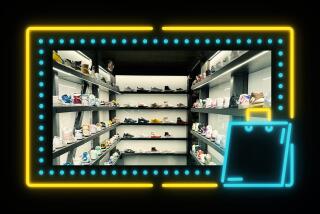Crazy Shirts Founder Rick Ralston : T-Shirt King Courted Success With $60 and a Creative Flair
- Share via
HONOLULU — When he was 18 and 19, Rick Ralston spent the summers of 1960 and 1961 on Santa Catalina hand-painting T-shirts and charging $2.85 apiece.
The rest of the year he was an art student at Art Center College of Design in Pasadena, supporting himself by working as a telephone repairman and a truck mechanic.
Then, in the summer of 1962, he dropped out of school, flew to Honolulu with $60 in his pocket and set up shop on a Waikiki sidewalk charging $5 to paint surfing scenes on T-shirts.
Ralston, 45, has since parlayed his $60 into a $33-million industry.
“So far as I know, I opened the first T-shirt store anywhere when I moved from the sidewalk to a bamboo shack at Waikiki’s International Marketplace in 1963,” explained the bearded founder of Crazy Shirts.
In his first year, he grossed $14,000. This year, sales will top $33 million, Ralston said, including $25 million in Hawaii and $8 million on the Mainland.
He employs a total of 450 at his factory in Honolulu, his T-shirt and sportswear plant in Tustin, 19 Crazy Shirts shops on Oahu, Kauai, Maui and Hawaii, and 10 Crazy Shirts outlets in California. Two more will soon open in Colorado.
“T-shirt sales peaked five years ago, then the bottom fell out and many companies folded. The market had been saturated, especially with cheap heat-transfer T-shirts that peeled and cracked,” Ralston recalled. “But we came through unscathed. In fact, for us, sales never dipped. They just keep zooming along.”
Crazy Shirts, which retail for $13 each, are sold exclusively in Hawaii and California at Crazy Shirts stores. There are 150 different designs, with the designs changing all the time.
For eight years, San Francisco artist B. Kliban has done a series of “hula cat” T-shirts for Crazy Shirts, cats such as Su Mo, a wrestling cat shown exercising with one foot in the air off a sumo mat, arms behind the neck, dressed in skimpy shorts and waistband.
Especially popular among Japanese tourists are shirts touting the “Sake Sistahs Sushi Bar,” a fictional Honolulu establishment, and the “Banzai Beach Club,” showing two surfers with boards under the setting rays of a Japanese sun.
Another favorite advertises “Big Dave’s Surf Shop” by showing the imaginary Big Dave with a wave on his head instead of hair.
Ralston was born in Upland, Calif., grew up in Montebello and graduated from Montebello High School in 1959. His first factory in Hawaii was a one-man operation in his garage; he hung T-shirts out to dry on a clothesline.
“I’m having fun. This thing just keeps rolling along. We have controlled growth with careful expansion. We are the 148th-largest industry in Hawaii, up from 225th the previous year,” said Ralston, as he munched popcorn.
Popcorn, soft drinks and juice are always free to his employees. He supplies them.
More to Read
Inside the business of entertainment
The Wide Shot brings you news, analysis and insights on everything from streaming wars to production — and what it all means for the future.
You may occasionally receive promotional content from the Los Angeles Times.










